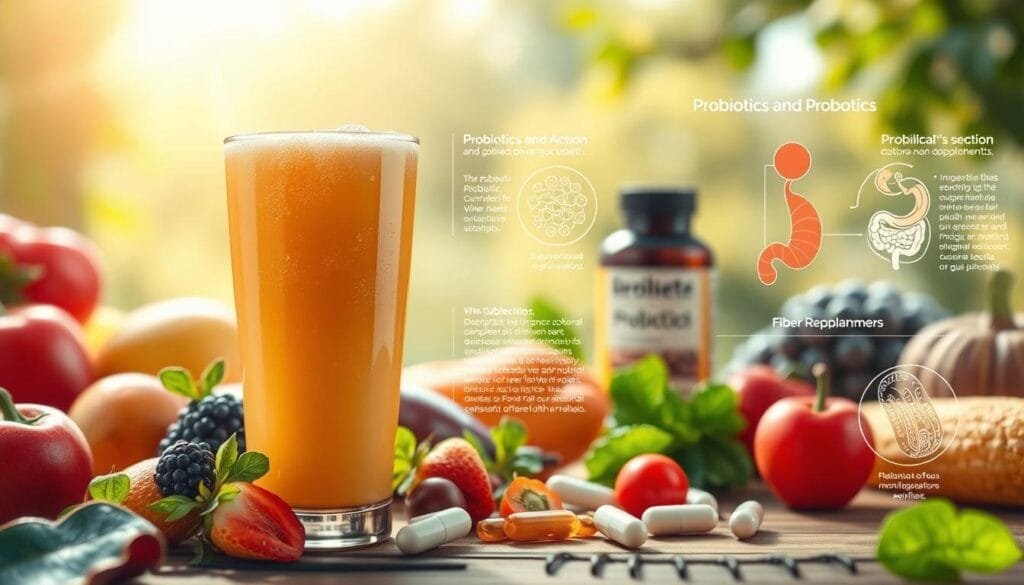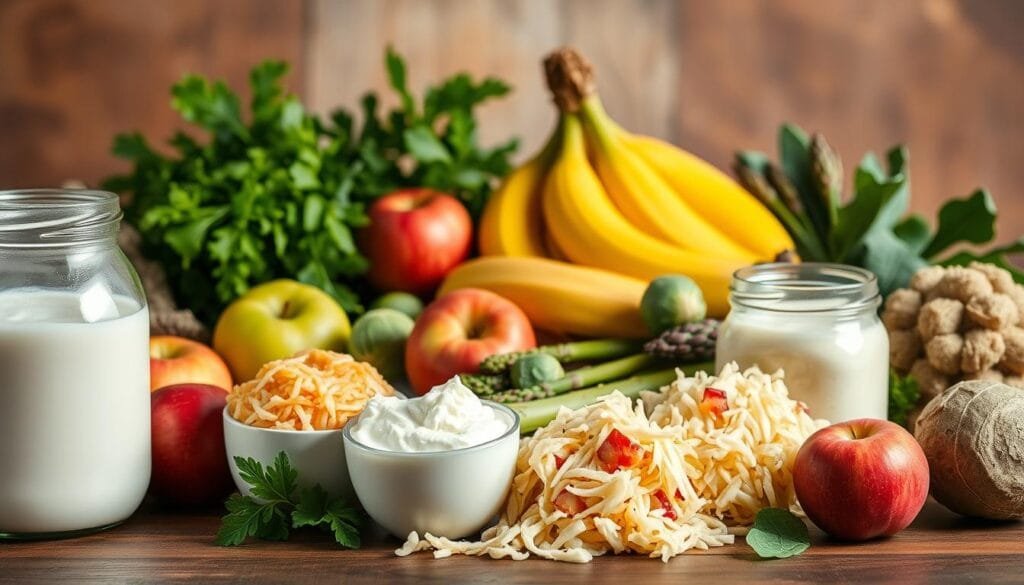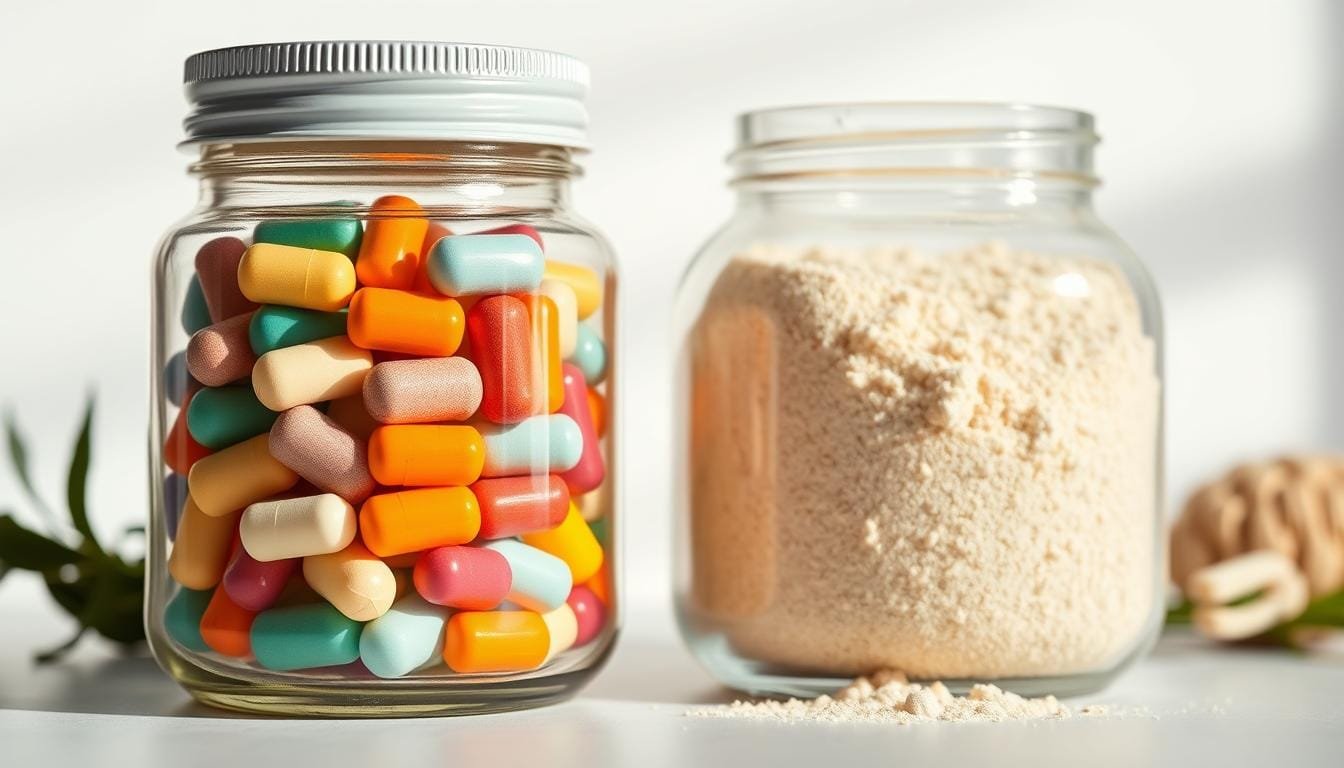Currently Empty: RM0.00
Gut health plays a crucial role in overall wellness, sparking debates about the best way to support it. Many wonder whether probiotics or fiber supplements offer more benefits. The answer isn’t simple—both contribute uniquely to a balanced microbiome and digestive function.
Wellness Concept specializes in digestive wellness, helping clients choose the right supplements for their needs. For personalized advice, reach out via WhatsApp at +60123822655. Business hours are Monday to Friday, 9:30 AM–6:30 PM, and weekends from 10 AM–5 PM.
This article compares the benefits of both options, explores food sources, and highlights how they work together for optimal gut health. Whether aiming for better digestion or immune support, understanding these supplements is key.
Key Takeaways
- Both probiotics and fiber supplements support digestive wellness differently.
- A balanced microbiome enhances overall health and immunity.
- Personalized guidance ensures the right supplement choice for individual needs.
- Whole foods can also provide natural sources of probiotics and fiber.
- Wellness Concept offers expert advice via WhatsApp for tailored solutions.
Understanding Probiotics and Fiber Supplements
Probiotics and fiber supplements serve distinct yet complementary roles in gut function. While both support digestive wellness, their mechanisms differ significantly. Here’s how each contributes to a balanced microbiome.
What Are Probiotics?
Probiotics are live microorganisms, primarily bacteria like Lactobacillus and Bifidobacterium, found in fermented foods such as yogurt and sauerkraut. These beneficial microbes colonize the gut, aiding digestion and immune function.
Different strains offer unique benefits. For example, L. acidophilus supports vaginal and urinary health. Antibiotics often disrupt these gut bacteria, making probiotic supplementation valuable for recovery.
What Are Fiber Supplements?
Unlike probiotics, fiber supplements typically contain prebiotics like inulin—a type of indigestible fiber that feeds existing gut bacteria. They don’t introduce new microorganisms but create a nourishing environment for them.
Not all fibers act as prebiotics. Whole grains and vegetables provide natural sources, while processed carbs lack this benefit.
Cedars-Sinai research highlights the microbiome’s complexity, noting supplements alone can’t replicate a diverse diet.
How Do They Differ in Function?
- Probiotics directly add beneficial bacteria to the gut.
- Prebiotics (in fiber supplements) fuel probiotic activity.
- Synergy matters: Combining both may enhance gut microbiome resilience.
For those exploring the health benefits of probiotics, pairing them with prebiotic-rich fibers can amplify results.
Key Benefits of Probiotics and Fiber Supplements
Modern research highlights unique advantages of probiotics and fiber supplements. Each supports gut health differently, offering distinct health benefits. Combining them may unlock synergistic effects for digestion and immunity.

Health Benefits of Probiotics
Probiotics like Lactobacillus and Bifidobacterium deliver multiple advantages:
- Immune support: Certain strains enhance white blood cell activity.
- Mental health: May reduce anxiety by modulating gut-brain signals.
- Vitamin K synthesis: Essential for blood clotting and bone density.
A 2022 study linked diverse bacteria to improved metabolic health, particularly in obesity management.
Health Benefits of Fiber Supplements
Prebiotic fibers fuel beneficial bacteria, promoting:
- Reduced inflammation: Butyrate production protects the gut lining.
- Bowel regularity: Soluble fibers soften stool, easing digestion.
- Cancer risk reduction: Linked to lower colorectal cancer rates.
Cedars-Sinai notes prebiotics’ critical role in maintaining microbial diversity, especially post-antibiotics.
Synergistic Effects When Combined
Pairing both creates a bifidogenic effect, where prebiotics amplify probiotic growth. This synergy:
| Probiotics Alone | Combined with Fiber |
|---|---|
| Transient colonization | Longer bacterial survival |
| Moderate digestion aid | Enhanced nutrient absorption |
| Strain-specific benefits | Broad-spectrum microbiome support |
For optimal gut health, consider integrating both into a wellness routine.
Is It Better to Take a Probiotic or Fiber Supplement?
Selecting the right strategy for digestive wellness depends on individual health needs. While both options offer benefits, specific situations call for one over the other. Here’s how to decide.
Prioritizing Probiotics
Probiotics excel in scenarios requiring microbial replenishment. They’re ideal after antibiotics, which disrupt gut flora. Specific strains like Bifidobacterium may ease IBS symptoms, according to 2021 research.
Other cases where they shine:
- Immune support: Strains like L. rhamnosus may reduce infection frequency.
- Traveler’s diarrhea: Certain blends prevent pathogenic overgrowth.
- Vaginal health: L. acidophilus balances pH levels.
Opting for Fiber Supplements
Those struggling to meet daily dietary fiber goals benefit most. Soluble fibers like psyllium relieve constipation by absorbing water. Prebiotic varieties (e.g., inulin) also nourish the microbiome.
Best for:
- Low-fiber diets lacking whole grains or vegetables.
- Chronic bloating or irregular bowel movements.
- Supporting butyrate production for gut lining health.
Synergistic Combination
Pairing both enhances microbial diversity. Fermented foods like kimchi (probiotic) with oats (prebiotic) create a bifidogenic effect. This synergy:
- Extends probiotic survival in the gut.
- Boosts short-chain fatty acid production.
- Addresses chronic issues more effectively than single solutions.
A 2020 study noted combined use improved IBS symptoms 30% faster than probiotics alone.
Wellness Concept designs personalized plans to balance these supplements with dietary adjustments. Over-reliance on pills without food sources may limit long-term gut health gains.
Food Sources: Probiotics and Prebiotic Fiber
Nature provides powerful gut-supporting nutrients through everyday fermented foods and fiber-rich choices. These dietary sources deliver live cultures and indigestible fibers that nourish beneficial bacteria. Incorporating them creates a sustainable approach to digestive wellness.

Top Probiotic-Rich Foods
Live cultures thrive in traditionally prepared fermented foods. Look for unpasteurized versions to ensure active bacteria:
- Yogurt with live cultures (check labels for L. acidophilus)
- Kefir – A fermented milk drink richer in strains than yogurt
- Kimchi – Korean spicy cabbage loaded with Lactobacillus
Avoid processed snacks marketed as probiotic—many contain added sugars that counteract benefits.
Best Prebiotic Fiber Sources
These vegetables, fruits, and whole grains feed gut bacteria:
| Food | Prebiotic Type | Serving Suggestion |
|---|---|---|
| Garlic | Inulin, FOS | 2-3 cloves daily |
| Bananas | Resistant starch | Slightly green for maximum effect |
| Oats | Beta-glucan | ½ cup raw for overnight oats |
Creating Synergistic Meals
Combine probiotic and prebiotic foods for enhanced effects. Try these dietary pairings:
- Kefir smoothie with banana and oats
- Miso soup with garlic-roasted Jerusalem artichokes
- Yogurt parfait with dandelion greens and berries
Start with small portions—sudden increases in fiber may cause temporary bloating.
Local Malaysian options like tempoyak (fermented durian) with ulam vegetables offer culturally relevant synergy.
Should You Take Probiotic or Fiber Supplements?
Deciding between gut-supporting products requires weighing their unique advantages and limitations. Each type addresses dietary gaps differently, with varying side effects and efficacy. Matching them to personal needs ensures optimal digestive outcomes.
Pros and Cons of Probiotic Supplements
Probiotic supplements introduce live strains like *L. acidophilus* to replenish gut flora. Benefits include targeted immune support and antibiotic recovery. However, challenges exist:
- Pros: May reduce IBS symptoms; specific strains combat traveler’s diarrhea.
- Cons: Stomach acid kills some bacteria; unregulated products lack consistent potency.
Cedars-Sinai notes that over-the-counter options often lack clinical proof for general use.
Pros and Cons of Fiber Supplements
Prebiotic fibers like inulin feed beneficial bacteria, promoting regularity. Yet, not all products deliver equal benefits:
| Advantages | Drawbacks |
|---|---|
| Eases constipation within days | Overuse causes bloating or gas |
| Supports butyrate production | Non-prebiotic fibers lack microbiome benefits |
How to Choose the Right Supplement
Prioritize third-party tested probiotic supplements with 10–50 billion CFUs. For fiber, psyllium husk or inulin blends offer prebiotic action. Wellness Concept’s team (+60123822655) tailors recommendations based on research and individual needs.
Combining both may enhance results, but consulting experts prevents mismatched solutions. Local Malaysian preferences, like temperature-stable strains, are also considered.
Who Should Avoid Probiotics or Fiber Supplements?
While probiotics and fiber offer gut health benefits, they aren’t suitable for everyone. Certain conditions or side effects may make these supplements harmful. Identifying high-risk groups ensures safer choices.
Potential Risks and Side Effects
Probiotics may cause bloating or gas in sensitive individuals. Those with compromised immune systems risk infections from live bacteria. Fiber supplements can worsen bloating if introduced too quickly.
Common side effects include:
- Diarrhea or constipation from abrupt fiber increases.
- Allergic reactions to supplement ingredients like inulin.
- Temporary discomfort as the microbiome adjusts.
Conditions That May Worsen with Supplements
Some conditions require caution:
| Condition | Risk with Probiotics | Risk with Fiber |
|---|---|---|
| SIBO | May exacerbate bacterial overgrowth | Can increase gas and pain |
| IBS-C | Strain-dependent relief | May worsen constipation |
2023 research notes certain probiotics improve IBS symptoms, contradicting earlier warnings. Professional guidance is essential.
Consulting a Healthcare Professional
Self-prescribing during pregnancy or chronic illness carries risks. A tailored plan from Wellness Concept (+60123822655) accounts for:
- Microbiome testing for targeted solutions.
- Adjustments based on antibiotics or surgeries.
- Local Malaysian dietary preferences.
WhatsApp inquiries ensure safe, personalized advice before starting any regimen.
Conclusion
Supporting digestion isn’t one-size-fits-all—personal needs dictate the best approach. Probiotics and fiber work together, each playing unique roles in gut health. A balanced diet rich in fermented foods and whole grains often provides foundational support.
For tailored advice, Wellness Concept offers expert guidance. Reach out via WhatsApp at +60123822655. Business hours are Monday–Friday (9:30 AM–6:30 PM) and weekends (10 AM–5 PM).
Prioritize whole foods over pills when possible. Small, consistent changes yield lasting health benefits. Need help? Consult the team for a plan matching your lifestyle and goals.
FAQ
What’s the main difference between probiotics and fiber supplements?
Probiotics contain live microorganisms that support gut bacteria, while fiber supplements provide prebiotics—non-digestible fibers that feed beneficial bacteria. Both play unique roles in digestive health.
Can probiotics and fiber supplements be taken together?
Yes! Combining them may enhance gut microbiome health. Fiber acts as fuel for probiotics, helping them thrive. Foods like yogurt with whole grains are a great example.
Which foods naturally contain probiotics?
Fermented foods like yogurt, kefir, sauerkraut, kimchi, and kombucha are rich in probiotics. These support gut health by introducing beneficial bacteria.
What foods are high in prebiotic fiber?
Bananas, onions, garlic, asparagus, and whole grains are excellent sources. These foods help nourish existing gut bacteria for better digestion.
Who should avoid probiotic supplements?
People with weakened immune systems, severe illnesses, or those undergoing chemotherapy should consult a doctor first. Some may experience bloating or discomfort.
Are there side effects of fiber supplements?
Excessive intake may cause bloating, gas, or cramping. Gradually increasing fiber and drinking water helps minimize these effects.
How do I choose the right supplement for my needs?
Consider digestive goals—probiotics for gut flora balance, fiber for regularity. Reading labels and checking for strains (like Lactobacillus) or fiber type (soluble/insoluble) matters.
Can children take probiotics or fiber supplements?
Some child-friendly options exist, but pediatrician advice is key. Foods like yogurt or fruits often provide safer, natural alternatives.



